We may not have the course you’re looking for. If you enquire or give us a call on + 800 908601 and speak to our training experts, we may still be able to help with your training requirements.
Training Outcomes Within Your Budget!
We ensure quality, budget-alignment, and timely delivery by our expert instructors.
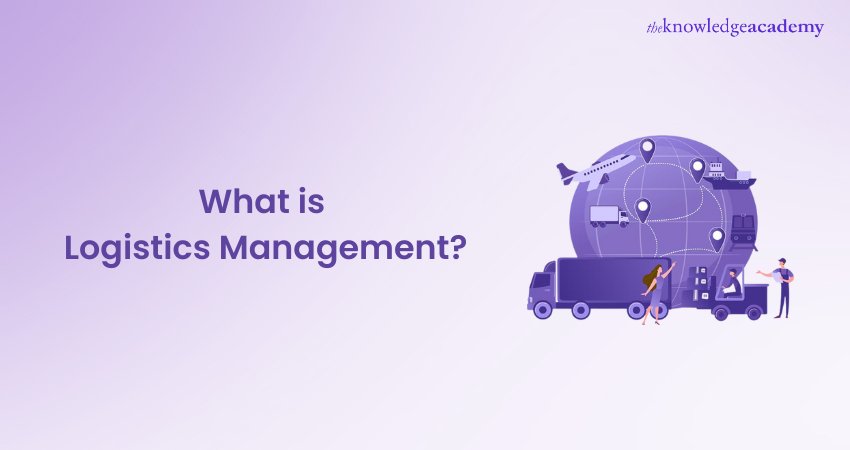
Ever pondered the journey of goods from factory to your front door? It’s all orchestrated by the meticulous art of Logistics Management. If you haven’t heard about What is Logistics Management and why it is crucial for modern businesses, let us explain it to you in this blog.
Modern consumers demand faster deliveries, real-time tracking, and high-quality services, which brings the need for advanced Logistics solutions. This is where Logistics Management comes in. This strategic approach ensures timely product movement and storage through efficient resource allocation, technology integration, and strategic planning. With the globalisation of business, mastering the complexities of Supply Chains that crisscross various nations and territories is more crucial than ever. Read this blog to understand everything about What is Logistics Management and how it can optimise the transportation, distribution, and storage of goods.
Table of Contents
1) Understanding What is Logistics Management ?
2) Evolution of Logistics Management
3) Key components of Logistics Management
4) Different Types of Logistics Management
5) The importance of effective Logistics Management
6) Challenges in modern Logistics Management
7) Technological advancements in Logistics Management
8) Conclusion
Understanding What is Logistics Management?
Logistics Management is a discipline that organises, implements, and controls the flow and storage of goods, services, and information. This process is not just limited to transportation. Instead, it represents an integrated effort that combines aspects of procurement, conversion, and distribution from the point of origin to the point of consumption.
The primary goal of Logistics Management is efficiency. It ensures that the right product reaches the right destination at the right time. This is achieved through a holistic approach that looks at every step, from sourcing raw components to the delivery of the final product to the end consumer.
Control is also a significant theme in Logistics Management. Businesses can improve their system and meet the needs of their customers by efficiently controlling the movement and storage of products in a cost-effective manner. Thus, it acts as a bridge, ensuring a seamless connection between production processes and the consumers who rely on their products.
Evolution of Logistics Management
Now that we have a clear idea of What is Logistics Management, let’s look at how this approach has developed.
Often, when we hear the term Logistics Management, images of large warehouses, trucks, and shipmen
t processes come to our mind. However, this is merely scratching the surface of a multifaceted discipline. It contains a vast string of procedures, each aiming for smooth resource transmission.
Historically rooted in military operations, the term Logistics once referred to the strategic movement and allocation of troops and supplies. However, in the world of modern business, its importance has expanded exponentially. Now, it doesn't just ensure that products reach consumers in a timely fashion. It also emphasises the necessity of optimising these routes for cost, efficiency, and sustainability. One cannot discuss Logistics without mentioning the pivotal role of information. When each product travels from producer to consumer, a parallel flow of data begins. This includes crucial details like stock quantities, transport timelines, and client information. This digital trail provides invaluable insights, enabling businesses to anticipate demand, streamline resources, and offer timely communication to the client.
Additionally, the world of Logistics Management is not static. In our rapidly digitalising world, E-commerce platforms and globalised trade paradigms have redefined traditional Logistics frameworks. Advanced software, real-time tracking tools, and predictive analytics have become indispensable allies. These tools not only ensure physical items move efficiently but also facilitate the strategic leveraging of data to adapt to market fluctuations and evolving consumer expectations.
Digitalisation has transformed the meaning of Logistics Management, making it a multifaceted discipline. It now combines strategy, technology, and foresight into a complex system. These components work together to ensure that products and services reach their destinations seamlessly in today's interconnected global marketplace. The figure below illustrates how the Transport Logistic System operates in modern businesses.
Key components of Logistics Management
Logistics Management is not just transportation. It contains numerous components that help the smooth functioning of the Supply Chain. From managing inventory levels to forging strong relationships with vendors, it is the silent force that keeps the wheels of commerce turning.
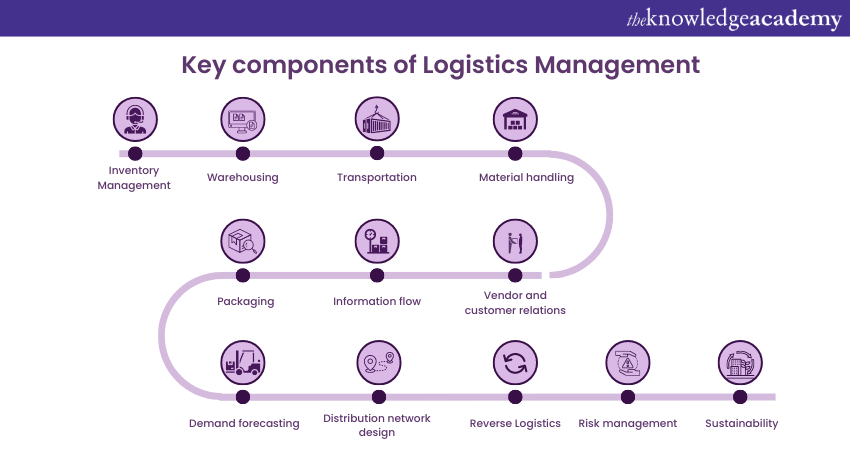
a) Inventory Management: Tracks and forecasts product levels to balance demand with available stock without overstocking.
b) Warehousing: Stores products before distribution. Prioritises space optimisation and minimises storage duration.
c) Transportation: Select optimal transport modes, like road or air. Also, aims for timely, cost-effective product delivery.
d) Material handling: Manages in-house product movement, including tasks like loading and arranging items efficiently to streamline operations.
e) Packaging: This goes beyond simple wrapping to ensure the safe transport of goods and support branding efforts. It includes considerations of material choice and environmental impact.
f) Information flow: Uses digital tools for improved Logistics for better tracking shipments, optimise routes, and predict demands.
g) Vendor and customer relations: It involves building and maintaining partnerships. Streamlined collaborations can lead to enhanced efficiencies and cost savings.
h) Demand forecasting: Uses past data to predict future demand helping businesses prepare and adjust strategies accordingly to meet market needs.
i) Distribution network design: Determines warehouse locations and product delivery paths. It is a crucial element in reaching global customers efficiently.
j) Reverse Logistics: Reverse Logistics involves managing returns and product recalls. It is a vital aspect in ensuring customer satisfaction and sustainable practices.
k) Risk management: Identifies potential Supply Chain disruptions. It involves developing strategies to mitigate or overcome these challenges.
l) Sustainability: Modern Logistics now emphasises eco-friendly practices. They focus on reducing environmental impact through various means.
Elevate your Logistics Management expertise by joining our Logistics Management Training today!
Different Types of Logistics Management
Logistics involves the process of planning, executing, and managing the flow of goods, services, and information from the point of origin to the point of consumption. It involves the entire processing of sourcing raw materials as well as the assembling of the products and the delivery of finished goods to esteemed consumers.
There are various kinds of Logistics Management which focus on the different stages and aspects of this activity. Each of the stages has a very important role to play in the overall efficiency and success of a Supply Chain. Some of them are mentioned below.
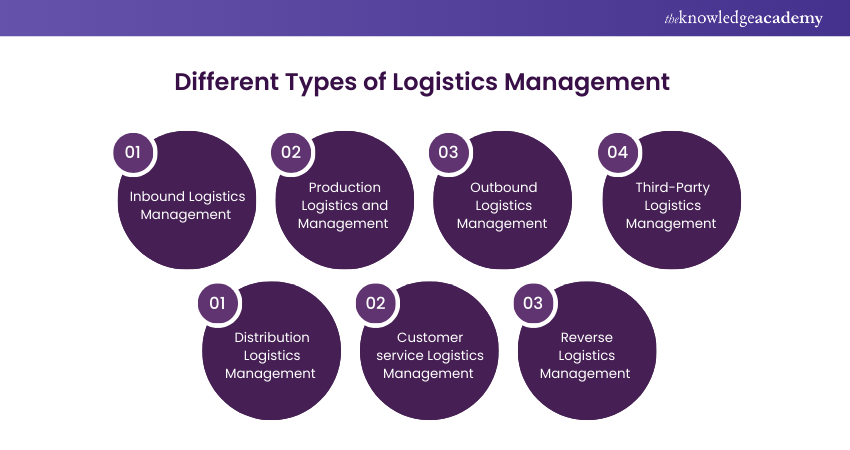
Inbound Logistics Management
Inbound Logistics is the process of receiving and storing raw materials and components that are necessary for production. It includes managing the flow of goods from suppliers to the company's warehouses or production facilities. Activities such as sourcing, purchasing, transportation, and storage comes under this process.
The Inbound Logistics process begins when an organisation identifies the raw materials or components it needs for production. This may include working with suppliers to negotiate prices, delivery schedules, and other purchase agreement terms.
Once the materials have been sourced, the company must arrange transportation from the supplier to the warehouses or production facilities of the company. This may involve coordinating with freight carriers, customs brokers, and other logistics providers to ensure that the materials are delivered on time and in good condition.
The Inbound Logistics process is important in ensuring that a company has the materials to operate efficiently and meet customer demand. By effectively managing the flow of goods from suppliers to the company’s facilities, businesses can reduce costs, improve supply chain visibility, and increase their competitiveness in the market.
Production Logistics and Management
Production logistics, also known as "Internal Logistics," "Intralogistics," or "Manufacturing Logistics," is a critical component of the logistics chain, positioned between procurement and distribution logistics. It often overlaps with these areas, ensuring seamless integration.
This discipline involves the planning, management, and control of internal storage, transport, and handling processes to maintain the efficient flow of materials within a company. When a company operates multiple production sites, production logistics extends to managing logistics across all locations, ensuring cohesive and efficient operations throughout the entire organisation.
Outbound Logistics Management
Outbound Logistics involves the storage, transportation, and delivery of finished goods to end customers, effectively moving inventory out of the Supply Chain to fulfil customer orders. A successful outbound logistics process encompasses several key elements: inventory management, order management, packaging procedures, and distribution networks.
Ensuring each order is prepared and delivered on time to the correct location is essential for successful sales. With a streamlined Outbound Logistics Process, businesses can consistently meet these goals, enhancing customer satisfaction and operational efficiency.
Third-Party Logistics Management
A Third-party Logistics (3PL) provider offers outsourced logistics services, managing various aspects of procurement and fulfilment activities. In business, 3PL refers to any service contract involving the storage or shipment of items.
3PL services can range from single solutions, such as transportation or warehouse storage, to comprehensive bundles that handle complete Supply Chain Management. This flexibility allows businesses to tailor logistics support to their specific needs, enhancing efficiency and scalability.
Distribution Logistics Management
Distribution Logistics varies by industry but generally involves the process of delivering finished goods from a manufacturer or supplier to retailers or distribution centres for fulfilment. For Direct-to-consumer (DTC) brands, this means managing the entire journey from the manufacturer to the point where orders are prepared for last-mile delivery.
During the distribution phase, DTC brands collaborate with various carrier partners to ensure shipments are delivered on time and at the most cost-effective rates, ensuring efficient and reliable delivery to customers.
Customer service Logistics Management
In today's interconnected world, the importance of efficient customer service in logistics cannot be overstated. With 70% of the buying experience based on customer treatment, delivering the right product, in the right quantity, condition, place, and time, to the right customer at the right price is crucial for successful logistics operations.
Meeting and exceeding customer expectations in a timely and reliable manner has become a key competitive advantage in the logistics industry. Customer service in logistics encompasses various activities and processes aimed at ensuring customer satisfaction throughout the supply chain. This includes managing the entire customer journey, from order placement to delivery and beyond, while addressing any issues or concerns that arise.
Most of the customers would spend more when companies provide personalised customer services. By offering exceptional customer service, logistics companies can build strong relationships with clients, enhance their reputation, and drive business growth.
Reverse Logistics Management
Reverse Logistics is a branch of Supply Chain Management that handles the return of goods from customers back to sellers or manufacturers. Once a customer receives a product, processes like returns and recycling necessitate reverse logistics.
This process begins with the end consumer and moves backwards through the Supply Chain, either to the distributor or directly to the manufacturer. Additionally, Reverse Logistics can involve the end consumer managing the final disposal of the product, including recycling, refurbishing, or resale. Learn to identify and mitigate potential risks in export and trade operations.
Learn how to identify and mitigate potential risks in export and trade operations with our Export and Trade Compliance Training – Register today!
The importance of effective Logistics Management
Logistics plays an indispensable role, from building a brand reputation to shaping strategic decisions. Read further to learn why Logistics Management is important for your businesses.
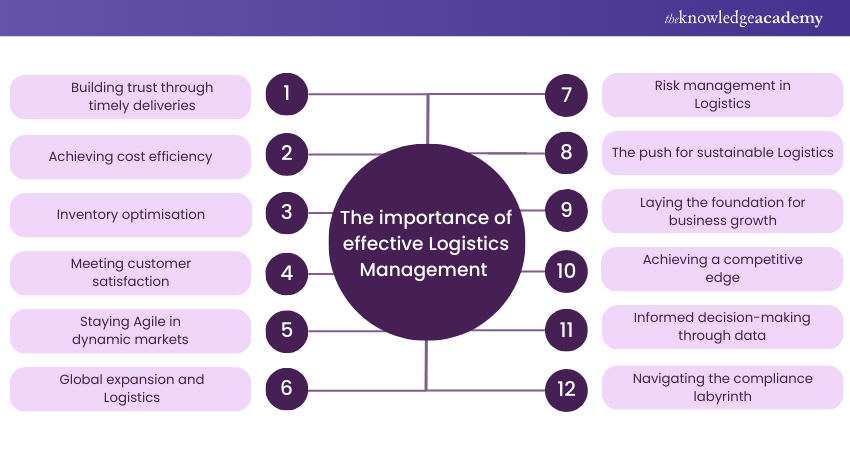
a) Building trust through timely deliveries: A company's reliability is judged by its promptness, which affects its reputation and trustworthiness. By ensuring timely deliveries, businesses can win the trust and loyalty of their customers and partners. However, delays can lead to wider disruptions.
b) Achieving cost efficiency: Logistics Management is about utilising resources optimally. A structured system minimises wastages and redundancies. This leads to significant operational savings.
c) Inventory optimisation: Overstocking increases capital and incurs costs, while stock-outs can halt production and result in lost sales. Therefore, including Inventory Management in the business process is essential.
d) Meeting customer satisfaction: Consumers today expect quick deliveries. Thus, meeting their expectations enhances brand loyalty and overall customer satisfaction.
e) Staying Agile in dynamic markets: Markets change rapidly. Thus, an Agile Logistics system ensures businesses remain competitive and responsive to these shifts.
f) Global expansion and Logistics: For businesses eyeing international markets, proper management of Logistics helps navigate cross-border regulations and manage transportation effectively.
g) Risk management in Logistics: Disruptions can strain Logistics, but a robust strategy identifies potential risks and creates effective mitigation plans.
h) The push for sustainable Logistics: Sustainability in Logistics is important. Eco-conscious consumers favour green Logistics, which can also lead to cost benefits.
i) Laying the foundation for business growth: Logistics supports business growth. When a company has streamlined operations, it can easily handle increased demands during expansion.
j) Achieving a competitive edge: Efficiency in Logistics can help a business advance further and stay ahead of competitors in the market.
k) Real-time Logistics data is invaluable: It helps strategic decisions, optimising resource allocation, and proactive problem-solving.
l) Navigating the compliance labyrinth: Logistics ensures adherence to industry regulations, safeguarding businesses from legal complications and potential fines.
Learn how to craft market-winning Product Management strategies by joining our Product Management Training now!
Challenges in modern Logistics Management
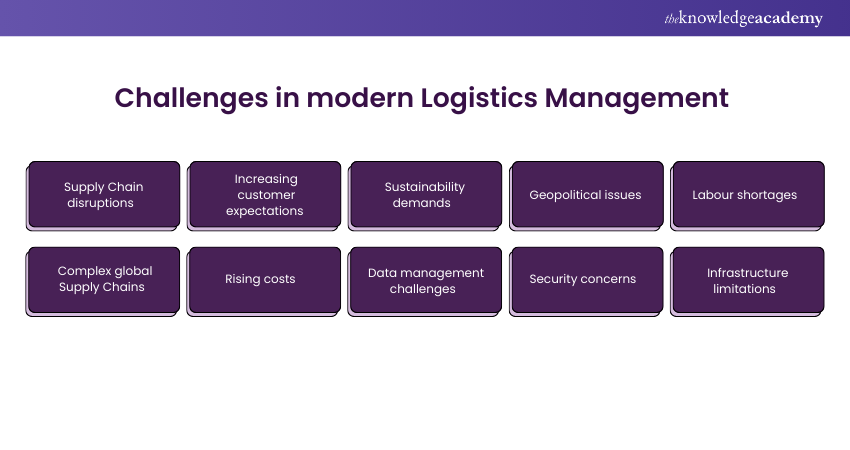
As businesses expand, consumer expectations also rise. In such a scenario, navigating obstacles becomes essential. From grappling with geopolitical complexities to meeting ever-evolving customer demands, today's Logistics Managers find their roles increasingly challenging. Let's see a few challenges that Logistics Managers face during Logistics Management:
Supply Chain disruptions
Disruption in the Supply Chain can be caused due to the following:
a) Natural disasters can halt transport routes, causing unforeseen delays.
b) Political upheavals can undermine stable supply sources.
c) Global events, like pandemics, unpredictably strain Logistics.
Increasing customer expectations
Increased customer expectations can be due to the following:
a) Today's customers often demand rapid deliveries, which stresses Logistics speed.
b) Real-time tracking isn't just a perk; it's expected.
c) Quick, efficient customer service is now a standard.
Sustainability demands
Environmental demands can have the following impact on Logistics Management:
a) Many businesses face pressure to lower their carbon emissions.
b) Environmentally friendly packaging is becoming a norm.
c) Consumers lean towards businesses practising sustainable sourcing.
Learn how to lead your industry with our Industry Training - sign up today!
Geopolitical issues
Geopolitical issues can give rise to the following problems:
a) Trade disputes can inflate import/export expenses.
b) Sanctions can lead to abrupt Supply Chain modifications.
c) Cross-border taxation varies, complicating cost calculations.
Labour shortages
Shortage of skilled labour can be due to the following reasons:
a) Skilled drivers and operators are often in short supply.
b) Warehousing sees high turnover rates, affecting the consistency.
c) Retaining skilled workers remains a persistent challenge.
Complex global Supply Chains
The vast network of global Supply Chain can hinder the following:
a) Effective communication across cultures is paramount. However, a lack of proper communication medium can disrupt the flow of information
b) Navigating diverse regulations is time-consuming.
c) Different countries mean varied payment methods.
Rising costs
With rising inflation comes the following challenges:
a) Fuel prices can be volatile, affecting transport costs.
b) Adhering to regulations can prove costly.
c) As economies grow, wages rise, pushing operational costs.
Data management challenges
With a vast network of Supply Chains, data can be prone to the following disruptions:
a) Merging different IT systems is a complex task.
b) Accurate and timely data is essential for decision-making.
c) Data security is paramount with increasing cyber threats.
Security concerns
Logistics Management can face security issues like the following:
a) Logistics is susceptible to cyber vulnerabilities.
b) Safeguarding goods from theft is crucial.
c) Each transportation mode has its security challenges.
Infrastructure limitations
Infrastructure challenges can also pose the following disruptions:
a) Some regions suffer from outdated transportation networks.
b) Ports or airports may face congestion issues.
c) Modern warehousing is a need, not a luxury.
Do you want to gain expertise in cost-effective maintenance? Join our Facilities Management Course today!
Technological advancements in Logistics Management
Advancements like Artificial Intelligence (AI), Internet of Things (IoT), and automation are enriching operational efficiency and reshaping Logistics practices. So, let’s have a look at how groundbreaking technologies are setting the course for the future of Logistics Management:
a) Adoption of AI and Machine Learning: AI improves demand forecasting, optimises inventory, and reduces costs.
b) IoT in Supply Chain monitoring: IoT devices provide real-time tracking, enhancing transparency and efficiency.
c) Blockchain for secure transactions: Blockchain ensures tamper-proof transactions, bolstering trust in Supply Chain processes.
d) Automated warehousing solutions: Robotics and automation streamline warehousing, speeding up processing and reducing errors.
e) Drones for faster deliveries: Drones are revolutionising delivery processes, especially in hard-to-reach areas.
f) Augmented Reality (AR) in training and maintenance: AR tools assist with equipment maintenance and training, enhancing efficiency.
g) Predictive analytics for decision making: Analytics provide insights for proactive decisions, foreseeing potential Supply Chain disruptions.
h) Robotics Process Automation (RPA): RPA automates repetitive tasks, enhancing accuracy and reducing manual intervention.
i) 3D printing in Logistics: On-demand manufacturing becomes possible, reducing the need for vast inventories.
j) Smart containers and IoT: Using containers with sensors to monitor cargo conditions, ensuring product quality during transit.
k) Digital platforms and integration: Unified platforms streamline operations, which improves collaboration between Logistics partners.
l) Self-driving vehicles: Autonomous trucks and ships can revolutionise long-haul deliveries, reducing human errors.
Conclusion
Understanding What is Logistics Management is important for modern businesses. It is the strategic coordination that ensures goods are efficiently moved and stored. This discipline highlights streamlined processes and astute resource management. It showcases the necessity of foresight and proactive planning to address current and imminent demands. We hope this blog has helped you understand everything about Logistics Management.
Get an in-depth understanding of optimising Supply Chain links with our Supply Chain Management Training - join today!
Frequently Asked Questions

The seven laws of Logistics are the right product, right quantity, right condition, right place, right time, right customer, and right cost. The laws are aimed at ensuring proper and effective Logistics Management with the goal of satisfying customer demand in the correct manner and at the least possible cost.

5S methodology in logistics means: Sort, Set in order, Shine, Standardise, and Sustain. The methodology is intended to organise and optimise the workplace towards achieving improvement in efficiency, wastage reduction, and safety and quality promotion in the logistics process.

The Knowledge Academy takes global learning to new heights, offering over 30,000 online courses across 490+ locations in 220 countries. This expansive reach ensures accessibility and convenience for learners worldwide.
Alongside our diverse Online Course Catalogue, encompassing 17 major categories, we go the extra mile by providing a plethora of free educational Online Resources like News updates, Blogs, videos, webinars, and interview questions. Tailoring learning experiences further, professionals can maximise value with customisable Course Bundles of TKA.

The Knowledge Academy’s Knowledge Pass, a prepaid voucher, adds another layer of flexibility, allowing course bookings over a 12-month period. Join us on a journey where education knows no bounds.

The Knowledge Academy offers various Industry Training, including Logistics Management Training, Facilities Management Training and Supply Chain Management Training. These courses cater to different skill levels, providing comprehensive insights into Importance of Logistics.
Our Business Skills Blogs cover a range of topics, offering valuable resources, best practices, and industry insights. Whether you are a beginner or looking to advance your Logistics Management skills, The Knowledge Academy's diverse courses and informative blogs have you covered.







 Top Rated Course
Top Rated Course




 If you wish to make any changes to your course, please
If you wish to make any changes to your course, please


